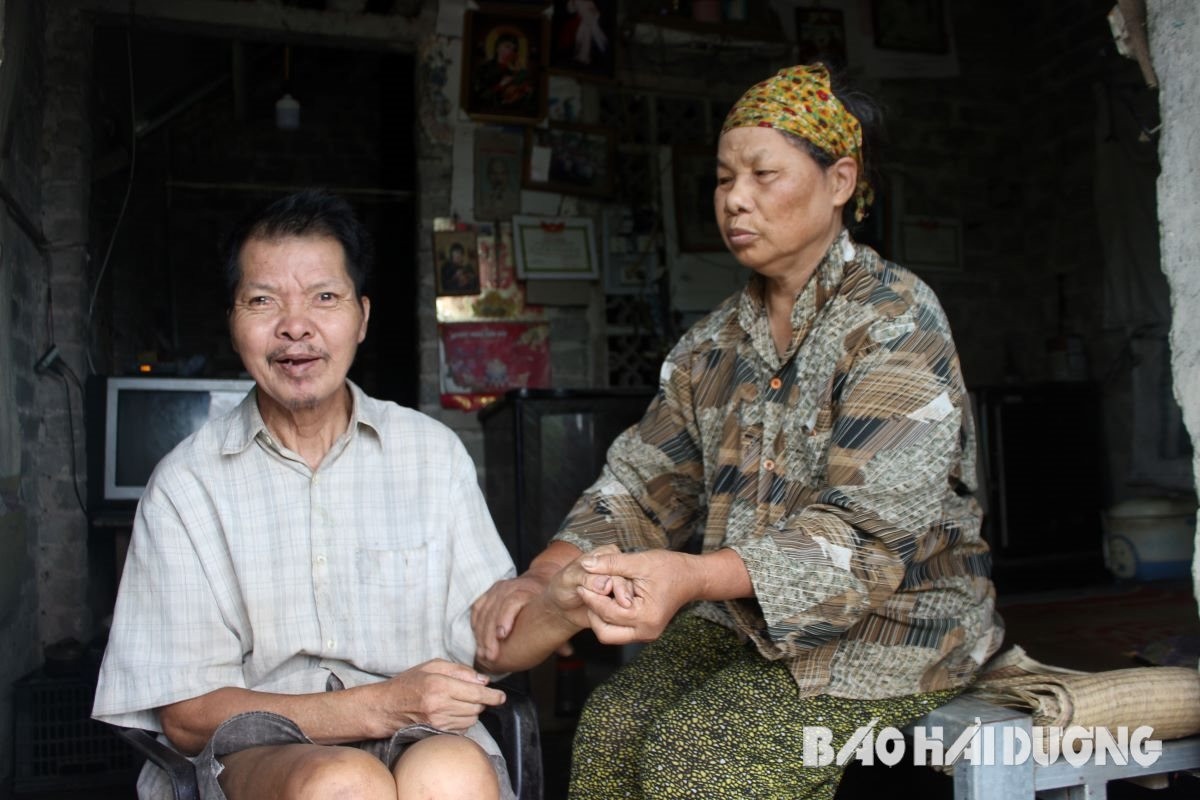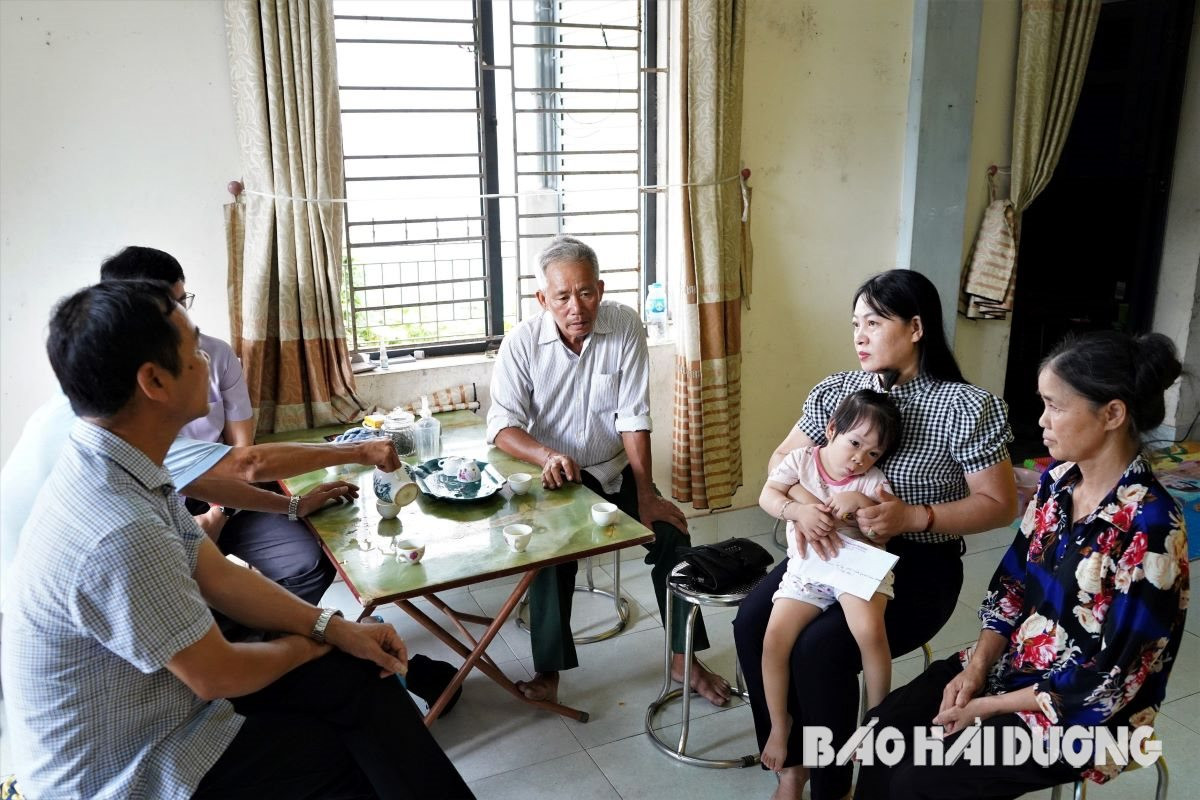Poor households with “no way out” are those without the ability to work and escape poverty. Hai Duong has been trying to find ways to help these households with practical social security policies.

Poverty surrounds
Mrs. Le Thi Thuan is over 70 years old this year in Thiet Tai village, Tai Son commune (Tu Ky). Her husband died early, leaving her with the burden of raising 3 children. But the situation is really difficult for that poor mother. Her eldest daughter got married but unfortunately both husband and wife suffered from strokes, seriously affecting their health. The second child works all year round as a concrete carrier and construction worker, raising a sick child. As for Mrs. Thuan's third child, he is over 30 years old this year but is still like a child. He has been disabled since childhood, cannot walk, everything from personal hygiene to eating must be supported by Mrs. Thuan.
Ms. Tran Minh Ly, Party Cell Secretary and Head of Thiet Tai Village, said that the life of Mrs. Thuan and her children is very difficult, and there is no way to escape poverty. Mrs. Thuan is old and has to take care of her children every day, so she cannot do anything to earn an income. Currently, the two of them live on the State's disability allowance and the caretaker policy, which is more than 1 million VND/month. With that amount of money, Mrs. Thuan and her children can only go hungry one day because she also has to save money to buy medicine for her son.
People in Thanh Xa commune (Thanh Ha) are familiar with the situation of the family of Mr. Vu Van Thuong (born in 1960) and Mrs. Pham Thi Be (born in 1961) in village 1. They had 3 children, all of whom had health and intellectual problems. Now they are over 30 years old, but all the children still live with their parents and cannot be independent. Mr. Thuong's health is also very poor, he walks slowly and often forgets things. Mrs. Be, due to poor eyesight, cannot do any work to earn money, she just takes care of her husband and children. The whole family of 5 lives in a shabby corrugated iron house next to a sad lychee garden. As time goes by, as they get older and their health declines, Mr. Thuong's family's dream of escaping poverty becomes more and more distant.
According to the Department of Labor, War Invalids and Social Affairs, the results of the periodic review of poor and near-poor households in 2023 showed that the whole province has 8,695 poor households, accounting for 1.34%. Of which, 6,013 poor households are unable to work and have difficulty escaping poverty.
Pillar social security policy

Finding a way to help poor households who are unable to work and are eligible for protection to escape poverty by their own strength is a very difficult and almost impossible problem. Mr. Nguyen Van Tinh, an officer in charge of labor, war invalids and social affairs in Thanh Xa commune, said that the whole commune has nearly 30 poor households who are unable to work. The commune has tried every way to support them. Regarding support for building houses, it is possible to call for resources. But to create jobs and stable income for these families is very difficult. Specifically, the Women's Union of the commune has tried to connect so that Mr. Thuong's 3 children can work for a business in Cam Giang, going back and forth by the company's shuttle bus every day. But after only a few days of working, one of them had to quit because they could not meet the requirements. The remaining 2 have only worked for more than a month but are also being taken care of by the company. Mrs. Be said that her children probably cannot work for long because of poor eyesight and limited cognitive ability, affecting work efficiency.
Mr. Luong Anh Te, Chairman of the Provincial Elderly Association, former Chairman of the Vietnam Fatherland Front Committee of Hai Duong province, said that for poor households under protection, if they do not have the support of society and relatives, they certainly cannot escape poverty. In which, the state's social security policies must be the mainstay. Mobilizing socialization is also very necessary and useful, but this source of support is often not long-term.
In fact, most of the poor households that have difficulty escaping poverty fall into the group of elderly and disabled people. In recent times, the Provincial Association of the Elderly at all levels has had many activities to support this group. However, Mr. Te said that the support is mainly spiritual, the material support is insignificant and cannot help them escape poverty, because the resources and appeals of the association are limited.
Currently, Hai Duong has raised the standard allowance for social protection beneficiaries to VND 380,000/person/month, VND 20,000 higher than the regulations in Decree No. 20/2021/ND-CP of the Government regulating social assistance policies for social protection beneficiaries. However, Mr. Te said that the province should also balance resources to have more practical policies to support social protection beneficiaries in general, and poor households with no working capacity in particular. Some localities near Hai Duong such as Quang Ninh, Hai Phong, Bac Ninh... have also implemented very effective social security policies for the elderly and vulnerable groups.
In order to achieve the goal of reducing the poverty rate according to the Resolution of the 17th Congress of the Hai Duong Provincial Party Committee for the 2020-2025 term, the Department of Labor, War Invalids and Social Affairs has proposed the Provincial People's Committee to continue to draft a resolution to submit to the Provincial People's Council on monthly social allowances for a number of subjects who are members of poor households in the province. Accordingly, it is expected to provide additional allowances for 8,636 people who are members of poor households who are unable to work to achieve a total allowance of 2 million VND/person/month.
If this policy becomes a reality, it will certainly be a joy and the key for poor households with "no way out" in Hai Duong to open the door of hope.
THANH NGA